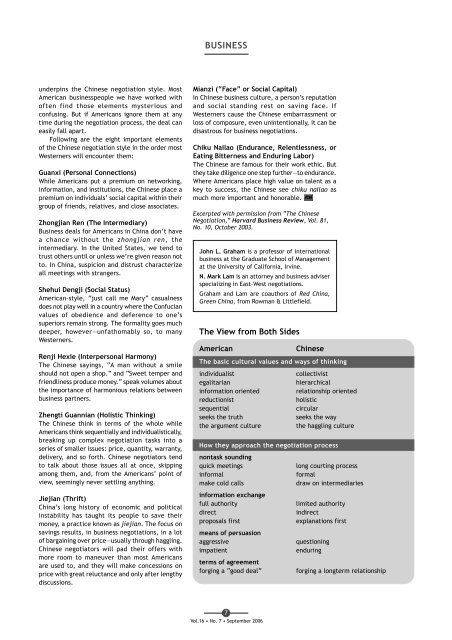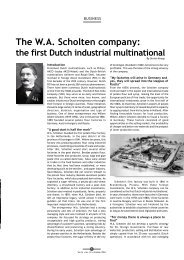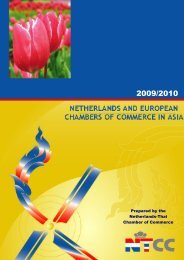Sept06 latest - Association of Dutch Businessmen
Sept06 latest - Association of Dutch Businessmen
Sept06 latest - Association of Dutch Businessmen
You also want an ePaper? Increase the reach of your titles
YUMPU automatically turns print PDFs into web optimized ePapers that Google loves.
BUSINESS<br />
underpins the Chinese negotiation style. Most<br />
American businesspeople we have worked with<br />
<strong>of</strong>ten find those elements mysterious and<br />
confusing. But if Americans ignore them at any<br />
time during the negotiation process, the deal can<br />
easily fall apart.<br />
Following are the eight important elements<br />
<strong>of</strong> the Chinese negotiation style in the order most<br />
Westerners will encounter them:<br />
Guanxi (Personal Connections)<br />
While Americans put a premium on networking,<br />
information, and institutions, the Chinese place a<br />
premium on individuals’ social capital within their<br />
group <strong>of</strong> friends, relatives, and close associates.<br />
Zhongjian Ren (The Intermediary)<br />
Business deals for Americans in China don’t have<br />
a chance without the zhongjian ren, the<br />
intermediary. In the United States, we tend to<br />
trust others until or unless we’re given reason not<br />
to. In China, suspicion and distrust characterize<br />
all meetings with strangers.<br />
Shehui Dengji (Social Status)<br />
American-style, “just call me Mary” casualness<br />
does not play well in a country where the Confucian<br />
values <strong>of</strong> obedience and deference to one’s<br />
superiors remain strong. The formality goes much<br />
deeper, however—unfathomably so, to many<br />
Westerners.<br />
Renji Hexie (Interpersonal Harmony)<br />
The Chinese sayings, “A man without a smile<br />
should not open a shop.” and “Sweet temper and<br />
friendliness produce money.” speak volumes about<br />
the importance <strong>of</strong> harmonious relations between<br />
business partners.<br />
Zhengti Guannian (Holistic Thinking)<br />
The Chinese think in terms <strong>of</strong> the whole while<br />
Americans think sequentially and individualistically,<br />
breaking up complex negotiation tasks into a<br />
series <strong>of</strong> smaller issues: price, quantity, warranty,<br />
delivery, and so forth. Chinese negotiators tend<br />
to talk about those issues all at once, skipping<br />
among them, and, from the Americans’ point <strong>of</strong><br />
view, seemingly never settling anything.<br />
Jiejian (Thrift)<br />
China’s long history <strong>of</strong> economic and political<br />
instability has taught its people to save their<br />
money, a practice known as jiejian. The focus on<br />
savings results, in business negotiations, in a lot<br />
<strong>of</strong> bargaining over price—usually through haggling.<br />
Chinese negotiators will pad their <strong>of</strong>fers with<br />
more room to maneuver than most Americans<br />
are used to, and they will make concessions on<br />
price with great reluctance and only after lengthy<br />
discussions.<br />
Mianzi (“Face” or Social Capital)<br />
In Chinese business culture, a person’s reputation<br />
and social standing rest on saving face. If<br />
Westerners cause the Chinese embarrassment or<br />
loss <strong>of</strong> composure, even unintentionally, it can be<br />
disastrous for business negotiations.<br />
Chiku Nailao (Endurance, Relentlessness, or<br />
Eating Bitterness and Enduring Labor)<br />
The Chinese are famous for their work ethic. But<br />
they take diligence one step further—to endurance.<br />
Where Americans place high value on talent as a<br />
key to success, the Chinese see chiku nailao as<br />
much more important and honorable.<br />
Excerpted with permission from “The Chinese<br />
Negotiation,” Harvard Business Review, Vol. 81,<br />
No. 10, October 2003.<br />
John L. Graham is a pr<strong>of</strong>essor <strong>of</strong> international<br />
business at the Graduate School <strong>of</strong> Management<br />
at the University <strong>of</strong> California, Irvine.<br />
N. Mark Lam is an attorney and business adviser<br />
specializing in East–West negotiations.<br />
Graham and Lam are coauthors <strong>of</strong> Red China,<br />
Green China, from Rowman & Littlefield.<br />
The View from Both Sides<br />
American<br />
Chinese<br />
The basic cultural values and ways <strong>of</strong> thinking<br />
individualist<br />
collectivist<br />
egalitarian<br />
hierarchical<br />
information oriented<br />
relationship oriented<br />
reductionist<br />
holistic<br />
sequential<br />
circular<br />
seeks the truth<br />
seeks the way<br />
the argument culture<br />
the haggling culture<br />
How they approach the negotiation process<br />
nontask sounding<br />
quick meetings<br />
long courting process<br />
informal<br />
formal<br />
make cold calls<br />
draw on intermediaries<br />
information exchange<br />
full authority<br />
limited authority<br />
direct<br />
indirect<br />
proposals first<br />
explanations first<br />
means <strong>of</strong> persuasion<br />
aggressive<br />
questioning<br />
impatient<br />
enduring<br />
terms <strong>of</strong> agreement<br />
forging a “good deal”<br />
forging a longterm relationship<br />
7<br />
Vol.16 • No. 7 • September 2006
















